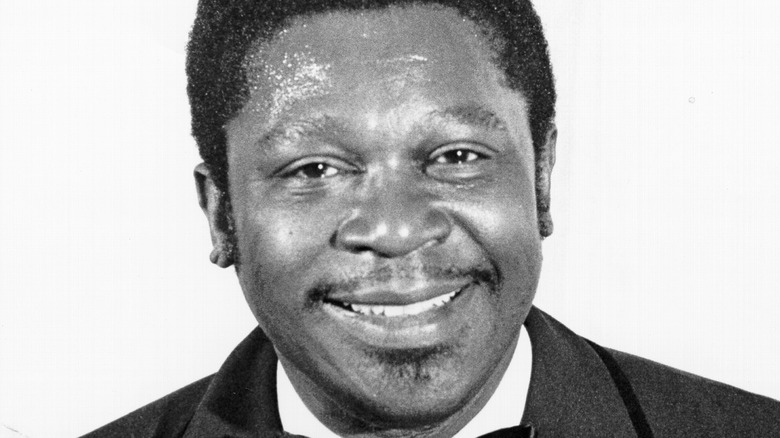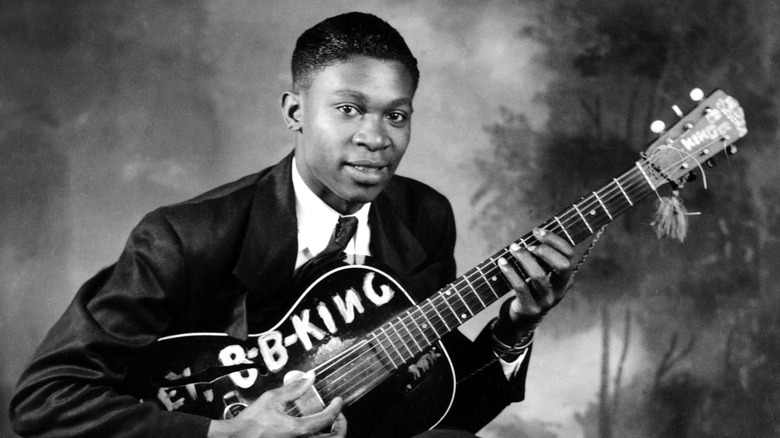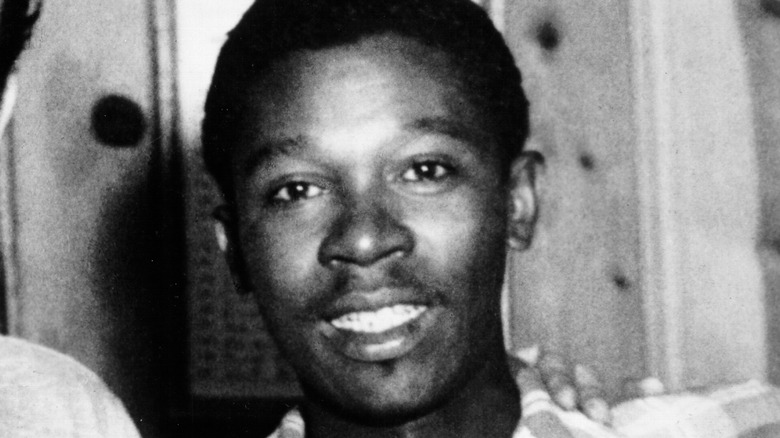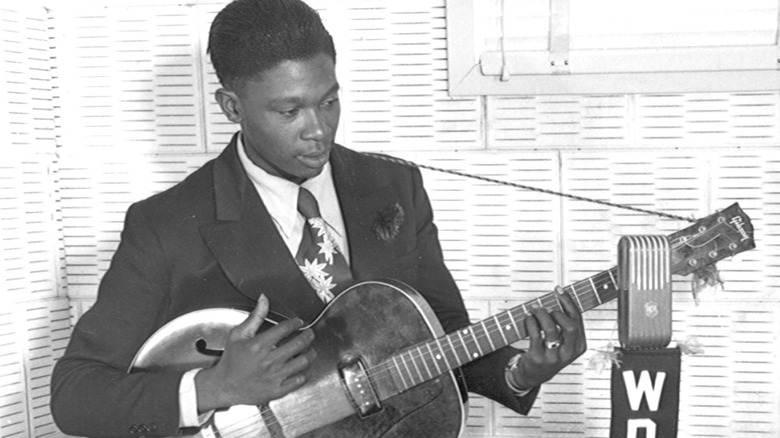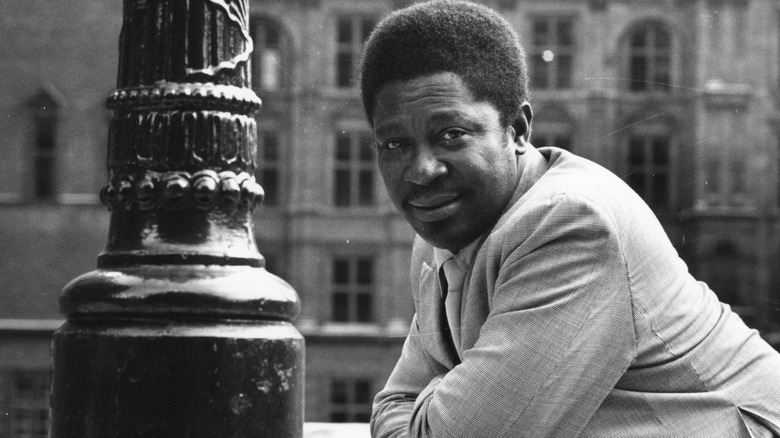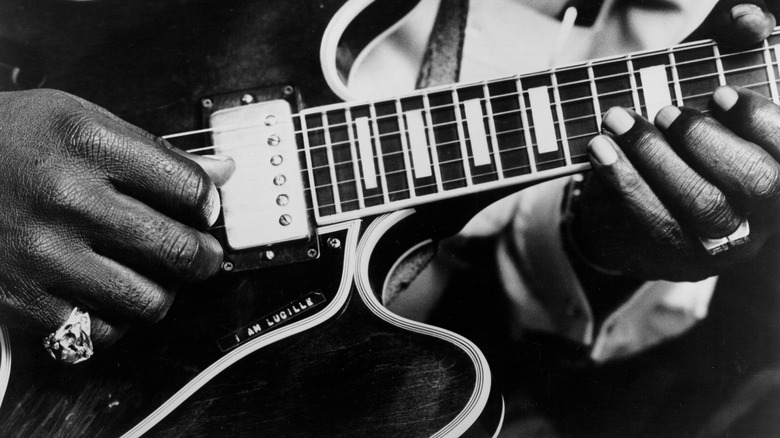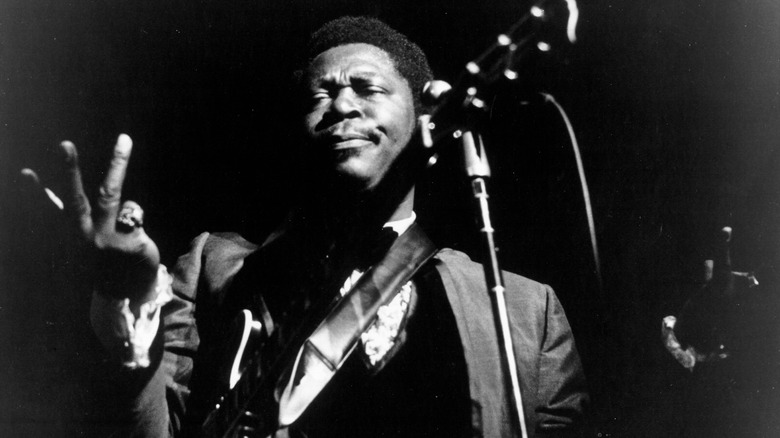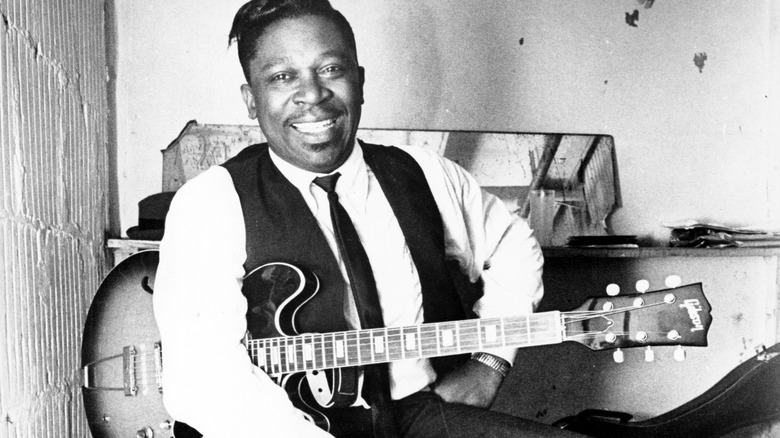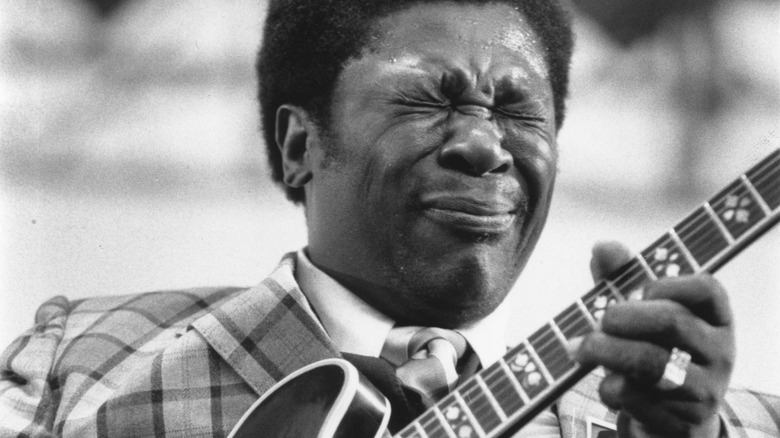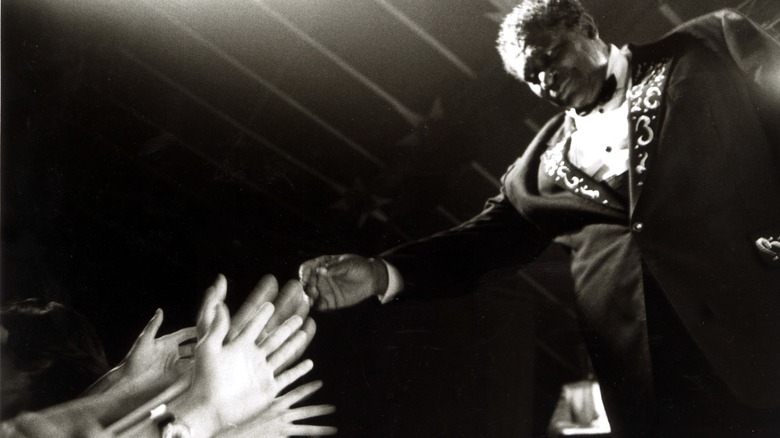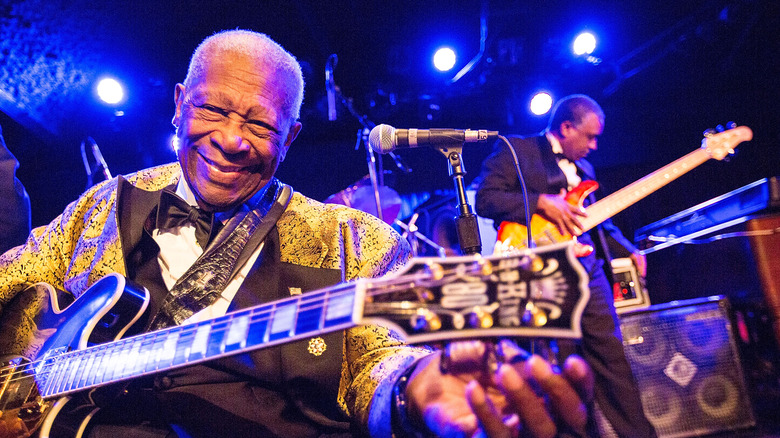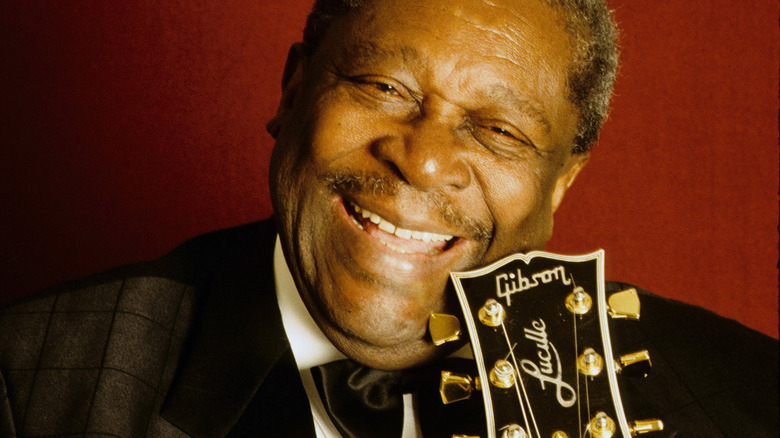The Tragic Real-Life Story Of B.B. King
There's no doubt about it, B.B. King is a blues legend. The musician, lovingly dubbed the King of The Blues until his death in 2015 (via PBS), had extraordinary guitar prowess, influencing other rock icons such as Eric Clapton and Mike Bloomfield, per Time. His list of credentials is stunning: according to USA Today, King won 15 Grammy Awards in his career (plus a Lifetime Achievement Award), played in 90 different countries, and snagged the sixth spot on Rolling Stone's 100 Greatest Guitarists list in 2015.
The "Rock Me Baby" crooner may have become blues royalty at the height of his career, averaging an incredible 340 shows a year, but that doesn't mean that his climb to the top wasn't filled with grueling difficulty. Born on a plantation in 1925 and already put to work at age seven, King spent most of his life grinding for success — even after becoming a musician. Per Pitchfork, the musician was forced to play in sketchy dive bars for decades, having been witness to countless fights and murders before finally achieving global success.
Amazingly, even though his career spanned almost a whopping seven decades, King always remained humble. "I don't play nothin' like I'd like to play," he told USA Today in 2015, adding, "There is a sound I've been searching for all these years." Perhaps because of that lifelong search, the Mississippi-born guitarist remained active on the music scene until the very end. This is the tragic real-life story of B.B. King.
B.B. King came from a broken home
Riley B. King was born on September 16, 1925 (he later changed his stage name to B.B., meaning "Blues Boy") to two plantation workers in Itta Bena, Mississippi. According to the Academy of Achievement, King's parents separated while the boy was only five, at which point his mother moved them to another town in the state, Kilmichael. A mere two years later, she put him to work.
While spending his days working on a plantation, King had musical aspirations on the side, finding influence through his church, which fueled his dreams of becoming a gospel singer. As detailed by the Academy of Achievement, after his preacher taught him the basics of guitar-playing, King struck a deal with his boss at work to get his own instrument and continued his learning through mail-order instruction books.
Sadly, tragedy struck the boy's life when he was nine, with his mother dying. Per "Development Arrested: The Blues and Plantation Power in the Mississippi Delta," King remained living in their home by himself, attending a one-room school with a class of 92 children while picking cotton and milking cows in his spare time. "I swore as a poor kid that when I grew up I would have what I wanted to eat when I wanted to eat it and I would never sleep in a dark room," the musician would later muse about this time of his life, according to "Life and Legacy of B. B. King."
As a youth, he worked as a cotton picker
B.B. King was left pretty much orphaned in the segregated south by the age of 11, with his mother dying two years prior, followed by his grandmother. "I felt deserted," he recalled to Classic Rock in 2012, adding that while he had some relatives nearby in Mississippi, he didn't like them enough to choose them as his guardians. To make matters worse, at the time of her death, King's grandmother owed money to the owner of a cotton farm, so the young boy's home had no electricity (via "Life and Legacy of B. B. King").
Remarkably, even without guidance from parental figures, King still went to school, picking cotton when he wasn't in class. In 2008, while giving a speech (via USA Today), the "3 O'Clock Blues" singer recalled this period of his life, where he earned 75 cents a day chopping cotton and 35 cents per hundred pounds of picking cotton. "I picked 480 pounds one day," he declared, adding that he still carries a sense of pride at the volume of his work in the sweltering heat.
According to Classic Rock, after two years of living alone, King's father found out what had happened and took him in to live with him and his new family in Lexington, Mississippi. Sadly, the future blues legend didn't get along with his new step-siblings and stepmother, resulting in him getting on his bike and peddling 100 miles back to where he grew up, in Kilmichael.
B.B. King dropped out of school in the tenth grade
B.B. King spent his formative years raised by his mother and grandmother, so when both of them died, the future musician tried to go live with his father's family in Lexington, Mississippi, at the age of 14. As King explained to Classic Rock, when that living arrangement didn't work out, he biked back home to Kilmichael, where he began picking cotton again.
King also went back to school for a brief while, although Rolling Stone notes that he dropped out in the tenth grade. Instead, while he wasn't picking cotton, the aspiring guitarist brushed up on his music knowledge through his cousin, Bukka White, leading to busking gigs singing gospel songs on street corners. "When I played gospel, people would pat me on the head," the singer recalled at a 2008 speech in Indianola, per USA Today. "But when somebody asked me to play a blues song, they would also give me a tip."
White proved to be a significant influence on King's life, not just musically. According to Classic Rock, his cousin helped him get a job at the Newberry Equipment Company, but he also influenced King's fashion prowess, too, telling him, "When you play the blues, always dress like you're going to the bank to borrow money."
He had two unsuccessful marriages
Although B.B. King found great success as a musician, the same can't be said for his love life. "It took me a long time to realize that you can't have all of the women," King told Rolling Stone in 1998.
King was married twice in his life; his first wife was Martha Lee, whom he met and wed after returning home to Kilmichael, Mississippi, after spending a short while living with his father, per Classic Rock. The pair wed in 1942, and as King told Rolling Stone, he was madly in love with Lee. "I guess I was looking for love, because I'd never had anybody I believed truly loved me," he mused. Sadly, King had a wandering eye, and after one instance where he was caught flirting with another woman, Lee had her guard up for the remainder of their marriage. They divorced in 1950 (via CNN). King found love again a few years later, this time with Sue Hall, whom he met during a nightclub gig. As "The Thrill is Gone" singer recalled to Rolling Stone, Hall agreed to marry him in 1958 if she could go on tour with her beau, but that marriage failed too, after eight years.
King regretted his marriage to Hall more than the first, blaming his inability to open up as part of the cause. Nevertheless, although King didn't further the love he had with his partners by having kids with them, he did father an estimated 15 children out of wedlock, per CNN.
He had a near-death experience that led to the naming of his iconic guitar
B.B. King's legendary guitar, Lucille, may be the only "woman" he ever truly loved. As the guitarist told Rolling Stone, the Gibson was considered his "homewrecker," and although he's had different variations of his beloved guitar, the adoration he had for them all never waned. So, how did King come across his first Lucille?
Still early in his professional career in 1949 (the same year he made his first album, per Biography), King would often play at an Arkansas nightclub called Twist. As the musician recalled to NPR, the Twist wasn't exactly a high-end establishment, and it was known to get chilly inside. As a result, employees would grab a garbage pail, fill it with fuel, and light it in the middle of the dance floor. As King remembered, one night, two men began fighting and knocked over the pail, leading to a massive fire in the club. After the musician got out, he remembered he had left his beloved guitar inside. "I went back for it ... I almost lost my life trying to save the guitar."
As King found out the next day, the cause of the altercation between the two men was a woman named Lucille. "I named my guitar Lucille and reminded me not to do a thing like that again." According to Biography, King later collaborated with Gibson to make a custom guitar, which, of course, took the moniker of his own famous instrument.
B.B. King's tour bus lawsuit
By the time the 1950s rolled around, B.B. King had finally solidified himself as a talented blues musician. According to the Academy of Achievement, the release and subsequent success of King's seventh single, "Three O'Clock Blues," meant he was ready to go on his first national tour, and his fame only soared. In 1955, the singer bought a tour bus, dubbing it "Big Red," and the following year, he and his band played an incredible 342 shows — all at different venues.
Sadly, a blissful life on the road was soon cut short by a freak accident in 1958. As revealed by the Academy of Achievement, one day, while King's bus was on the road in Texas, it crashed into a gas truck on a bridge. The blues legend wasn't in the vehicle at the time, and while none of his bandmates were severely injured, the gas truck driver sadly died. To make matters even worse, that same weekend, King's insurance company had terminated his account.
The widow of the deceased ultimately sued King for "damages for the wrongful death of and conscious pain and suffering of the deceased" (via Justia U.S. Law) and won, with the suit costing the musician a whopping $375,000 at the time, per Jet. According to MusicRadar, the following years meant King's priority was paying off his debts. As a result, he had to play more modest concerts, getting rid of his big band and only keeping a handful of musicians.
B.B. King had a gambling addiction
As B.B. King's popularity grew, so did his earnings — yet he didn't have much to show for it by the mid-1970s. As detailed in "King of the Blues: The Rise and Reign of B. B. King," his longtime manager, Sidney Seidenberg, was the man responsible for King's monetary success, but he was also there to witness his client's spiraling gambling addiction.
"The first time [B.B.] played keno in Vegas, he put down a dollar and won $23,000," recalled producer Stewart Levine in the musician's biography. In fact, at the height of King's addiction, he would reportedly play keno for 24 straight hours, his bandmates sometimes spotting him haplessly searching the ground for tokens after he had run out. Ultimately, Seidenberg struggled to watch his client waste away his millions (around $40 million, to be exact, according to King).
Thankfully, Seidenberg managed to save King from his financial nosedive, yet it was an incredibly close call. According to Rolling Stone, the manager was alarmed when King announced he'd be taking up a residency in Las Vegas in 1975, but he found a way to keep his gambling addiction in order: Seidenberg told his client to deny any sort of casino credit for his concert earnings. Instead, King wrote checks. "I did that, and when I noticed how big some of those checks were, that cured my gambling. I go home now; I don't want to go to the casinos," the singer told the music mag in 1998.
He dealt with diabetes for over two decades
B.B. King was diagnosed with type 2 diabetes sometime in the early 1980s. "I thought I wouldn't live very long," the singer recalled to Diabetes Health in 2005, adding, "I didn't know much about diabetes." King believed that his health condition may have been genetic, noting that his father, who died at the age of 87, suffered from high blood glucose and gout. Meanwhile, King's mother, who died when he was nine, reportedly went blind before her death. "It must have been related to diabetes," King mused.
According to Dr. Gabe Mirkin, a physician and radio talk show host, King's life in poverty as a young boy meant he was most likely nutritionally deprived, meaning he was at high risk for the chronic health condition. Looking at photos of the musician earlier in his career, Mirkin writes, "His huge stomach tells me that he was already headed for diabetes and was probably diabetic for many years before he was diagnosed."
Regardless of when King was officially diagnosed, living with diabetes meant dealing with issues that arose from time to time. In 1998, King told Rolling Stone that he had insomnia, which he believed was a result of his diabetes. His health began wavering, too, and as he told the outlet, he started doubting his ability to play nightly shows. In April 2015, the blues legend was hospitalized for dehydration due to his condition. He died a month later.
It took decades for B.B. King to become a global sensation
B.B. King may have dominated the Rhythm and Blues charts in the early 1950s when he was still a young musician, but that doesn't mean he was selling out massive venues; instead only popular with Black audiences, per the Academy of Achievement. According to a Time profile in 1969, up until the previous year, King was stuck playing at dive bars and seedy clubs, and although he was playing over a reported 300 shows a year, he could never really win over the entire country. As the profile noted, King, unfortunately, didn't have the same high-paced energy as, say, Chuck Berry and Bo Diddley, whose commercial success profited off of the emergence of rock in the 1950s.
"I've put up with more humiliation than I care to remember," King recalled about touring segregated America in his autobiography, "Blues All Around Me" (via The Guardian). "Forever being stopped and harassed by white cops hurt you most cos you don't realize the damage. You hold it in."
Fortunately, as time went on, different genres of music became the rage. As rock with more of a blues-inspired edge began creeping up in the late '60s, so did King's popularity. Per Time, newcomers onto the music scene such as Eric Clapton and Mike Bloomfield cited King's guitar work as inspiration. The result was a rise in popularity among white audiences. "People are starting to go with me," King told Time. "Blues is a message, and they're getting it."
With his failing health, B.B. King still performed into his old age
B.B. King reached the height of his success in the early-to-mid-1960s, thanks to younger British musicians across the pond who cited the blues icon as a huge inspiration, per the Academy of Achievement. According to The Washington Post, in 1963, King signed with ABC Records, and a mere two years later, he released "B.B King Live at the Regal," an album that Rolling Stone would go on to dub one of the "Top 500 Greatest Albums of All Time."
Throughout the '70s and '80s, King performed almost 300 shows a year throughout the world (via Academy of Achievement). As he grew older, he took to the stage less, and by 2003, that number went down to 200. Speaking to The New York Times that year, the legend admitted that he was growing tired. "'If I don't keep doing it ... they'll forget me,” King sadly mused. At this point in his life, the overweight star struggled with hypertension and diabetes, and he revealed that the only exercise he had was traveling from different airports. Nevertheless, King was committed to his fans.
Interestingly enough, even though he accomplished jaw-dropping success coming from an early life of poverty, King believed there was always room for improvement. Speaking to The Observer at the age of 86 in 2012, King revealed, "I know it can never be perfect, it can never be exactly what it should be, so you got to keep going further, getting better" (via The Guardian).
He died in 2015 due to old age, yet his daughters say he was murdered
In October 2014, B.B. King collapsed during a show in Chicago. According to NBC News, he cited dehydration and exhaustion brought on by his diabetes as the reason and was put under hospice care. By the following year, on May 14th, King died in his sleep.
By the end of May, two of the musician's daughters, Karen Williams and Patty King, sparked a murder investigation, claiming that LaVerne Toney and Myron Johnson, the assistants who were tasked to look after the ailing guitarist, poisoned King (via Page Six). "We're his children," declared Patty at the time, adding, "We're going to fight this with every breath in our body."
In July 2015, NBC News published the results of King's autopsy, claiming that the "Chains and Things" singer died of Alzheimer's disease, along with complications associated with old age. Although charges were dropped against LaVerne and Johnson, the latter sued for defamation, with the accusations dividing King's 15 children. According to The Hollywood Reporter, the fight for who would be appointed trustee of the musician's estate was still ongoing in 2016. "My dad told us, 'Even when I'm gone, I'm gonna take care of you.' But we haven't received a dime since he died," declared King's son, Riley B. King.
